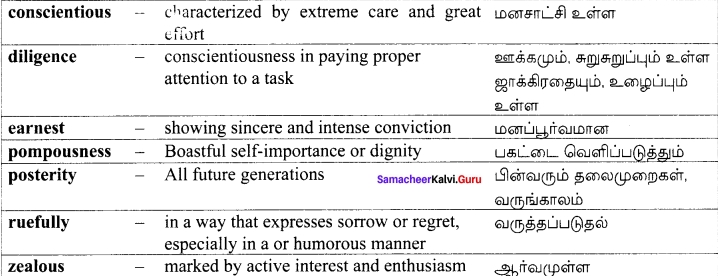Students can Download English Poem 6 Incident of the French Camp Questions and Answers, Summary, Activity, Notes, Samacheer Kalvi 12th English Book Solutions Guide Pdf helps you to revise the complete Tamilnadu State Board New Syllabus and score more marks in your examinations.
Tamilnadu Samacheer Kalvi 12th English Solutions Supplementary Chapter 6 Remember Caesar (Play)
Warm up
Study the title of the play “Remember Caesar”. Who is Caesar? What is he remembered for? Let us go through the pages of history succinctly to answer the above questions.
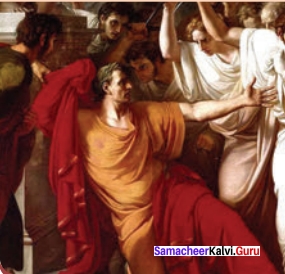
- Julius Caesar was a brilliant military general and great Roman monarch.
- He was bom on the 13th of July in 100 BC (BCE).
- He created the Julian calendar which is the basis for todays calendar.
- He was assassinated by a group of Roman senators in 44 BC(BCE).
- The day that Julius Caesar was murdered,
- 15 March, was called the Ides of March in ancient Rome.
1. Complete the summary of the play, choosing the appropriate words from the list given below the passage.
| callous | unperturbed |
| well-known | gardener |
| reminder | zealous service |
| Remember Caesar | assassination |
| shut | convinced |
Lord Weston was a(1) _____ judge in England. Being pompous and vain, he told his secretary Roger that he had attained glory by hard work and (2) _____ He expressed his displeasure over Roger’s request for a half-holiday. Suddenly, he discovered a piece of paper with the words (3) _____ in his pocket, and he feared that the message was a warning conveyed by his enemies who had received legal punishments from him. As the message was sent on the 15th of March, (the day Julius Caesar was assassinated), he was (4) _____ that someone affected by his fair judgement was plotting his murder. Sensing the definite attack, Lord Weston ordered his secretary to (5) _____ all the doors and windows. But his wife remained (6) _____ by the threat. So, Lord Weston was angered by her (7) _____ reaction. He ordered Roger to send the cook and the (8) _____ away. Both Weston and Roger took elaborate precautionary measures to thwart the (9) _____ attempt. Finally, Weston was able to recollect that he had written the message “Remember Caesar” himself as a (10) _____ Caesar was actually a gardener who had an appointment to visit Weston’s garden. The play revolves around Weston’s absentmindedness which is the crux of the play.
Answer:
- well-known
- zealous service
- Remember Caesar
- convinced
- shut
- unperturbed
- callous
- gardener
- assassination
- reminder
2. Based on your understanding of the text, answer the following questions briefly.
Question (а)
How did Lord Weston describe himself?
Answer:
Lord Weston claimed that he had won his honours by hard work and zealous service. He is acknowledged as the most impartial judge in England.
Question (b)
How did Roger react to Lord Weston’s advice?
Answer:
Roger was jolted from his self-indulgent absent mindedness. He made a calculated guess that Mr. Weston must have recounted his rise to success and advised him to emulate his hard work and zealous service. When Mr. Weston was busy advising, Roger had resumed his work of taking notes.
Question (c)
What made Lord Weston think that his life was in danger?
Answer:
Lord Weston dug out a scrap of paper from his coat pocket. He imagined that it should have been placed by some unknown adversary. The words “Remember Caesar” reminded him of the Ides of March when Caesar was assassinated. Unfortunately, it was also the 15th of March. So, Mr. Weston deduced that he was likely to be assassinated on that day by someone who got punished through him in the court.
Question (d)
Why was the speaker keen to know what day it was?
Answer:
The speaker was keen to connect the scrap of paper with the Ides of March.
Question (e)
Mention the immediate steps taken by Lord Weston to protect himself from his assassin.
Answer:
He had all the doors except the kitchen bolted and locked from within. He wanted to diffuse allegedly a parcel deemed to contain a bomb, by keeping it soaked completely in a pail of water. He ordered the gardener to sit under the Ilex tree so that snipers can’t have access point to shoot at him. He sent all the servants away.
Question (f)
Do you think that Lady Weston did not care about the threat to her husband? State reasons.
Answer:
Lady Weston did not care much about the threat to her husband because she does not believe in the seriousness of the threat. She wanted to remove the portrait of his aunt from gun shot point so that Mr. Weston’s property is saved. She says only big people get assassinated. The assassination, if it happens, will make Mr. Weston great. She wants to let the grocer in. She is cool headed throughout the play.
Question (g)
How did Lord Weston ‘defuse’ the ‘infernal machine’?
Answer:
Lord Weston asked Roger to bring the pail of water, he placed the parcel of infernal machine inside. It floated. To drown it, Mr. Weston used some books.
Question (h)
Whose life was of ‘great value’ to England? In what way?
Answer:
According to Roger, Mr. Weston’s life was of great value. He was the most well-known and most impartial judge in England.
Question (i)
Why did the speaker consider his life less important?
Answer:
The speaker considered his life less important as he was just an assistant of Mr. Weston.
Question (j)
Who reminded Lord Weston about Mr. Caesar?
Answer:
Mr. Roger reminded Mr. Weston of the appointment made between him and Mr. Caesar regarding rose trees. He had come to discuss the deal on planting rose trees in his garden.
Question (k)
What was the truth about the crumpled piece of paper?
Answer:
Judge Weston himself had written “Remember Caesar” to remind himself about the appointment on 15th March with that gardener.
Question (l)
Bring out the irony in the message “Remember Caesar”.
Answer:
The message “Remember Caesar” was written by judge Weston. He himself forgot the context in which he had written it. Being an absent-minded fellow, he thought it was a coded message informing him of a w ell-thought out assassination on the Ides of March.
Additional Questions
Question (a)
Why did Mr. Weston rebuke Mr. Roger for asking half-a-day leave?
Answer:
Roger had availed half a day leave only the previous month. Mr. Weston thought that he was trying to have needless leisure time. So, he rebuked him.
Question (b)
How did Roger convince Mr. Weston of the need to avail half a day leave?
Answer:
Mr. Roger said that he wanted to interview the clerk of Awards Committee and find out why he had not sent the document. Thus he convinced his boss of the need for half a day leave.
Question (c)
Why did the judge link the words “Remember Caesar” to Ides of March?
Answer:
Julius Caesar was assassinated on the Ides of March. “Remember Caesar” took him to the scene of assassination.
Question (d)
What according to Weston is the beginning of greatness?
Answer:
According to Weston, attention to detail is the beginning of greatness.
Question (e)
How does Weston justify the cause for the impending assassination?
Answer:
For an instrument of justice (i.e.) judge over men sooner or later revenge awaits. And the juster ‘ a judge has been, the more fearless, so much greater will be the hate that pursues.
Question (f)
Why does Weston want to thank them for the warning?
Answer:
Mr. Weston wants to thank them for the warning given because it helped him in making sure that even if he may die before his time, he won’t die on 15th March. As there was time to bar doors and take preventive actions.
3. Based on your understanding of the play, complete the Graphic Organiser (GO)

Answer:
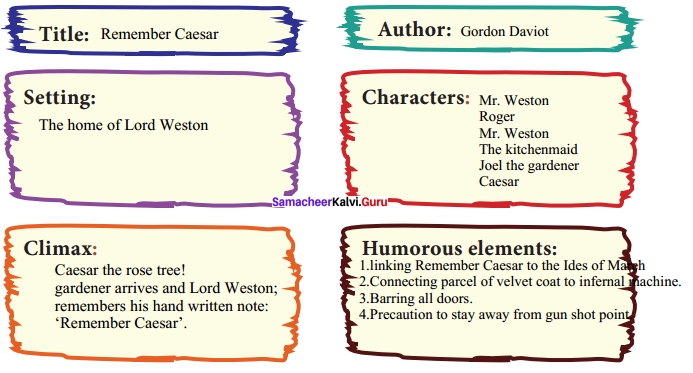
4. Answer the following questions in a paragraph about 150 words each.
Question (a)
“Remember Caesar” is a light hearted comedy. Discuss the statement in a group and identify various aspects such as title, plot and characterisation that contribute to the humour in the play.
Answer:
Remember Caesar is a light hearted comedy. The name Caesar is the name of a tragic hero Julius Caesar in one of the plays of William Shakespeare. Weston gives an appointment to Mr. Caesar to discuss rose tree planting work in his garden. Just to remind him of the proffered appointment, he scribbles two words “Remember Caesar” and keeps that scrap of paper in his coat pocket. Roger, the assistant of the judge elevates him to the level of a tragic hero. He flatters the judge that his death could be a great loss to England as he was a great impartial judge whose integrity could not be bargained or bribed. Mrs. Weston’s entry lightens up the whole drama and the tragedy transitions into a dark comedy. Lady Weston keeps hinting about earlier attempts when he was eating a game pie.
She becomes seriously playful when she says, “you’ve ahvays w’anted to be a great man and now you’ve got your wish. They don’t assassinate nobodies.” She cool-headedly tells her husband that he can stay indoors and have drinks. Lady Weston asks her husband if someone was planning to murder him. He says, “obviously”. She gives a curt retort, “I wonder someone hasn’t done it long ago. A great many people must hate judges. And you are a strict judge, they say.” When Weston says he has instructed Roger to barricade all doors, her immediate worry is about the grocery awaited. She asks if he was expecting both French and Dutch together in the attempt to assassinate. When Weston asks if a little pepper was more important to her than her husband’s life, she says that he would be the first person to complain if the bread was short and the gravy thin. The cook disobeys the order. She has never been “behind the bars”. She will handle any one who enters by the kitchen. A judge and his assistant want the door locked but a cook is not afraid. Lady Weston doesn’t want to send away the cook. She is practical. She w’ants her to stay back to cook his pet dishes.
Lady Weston brings a handful of candles to keep the room lit if Mr. Weston has to stay underground for a while. A velvet coat is construed as an infernal machine that could blow up the whole place is smothered with books inside a pail of w ater to the great annoyance of Lady Weston. She casually reminds her husband that doctor disapproves of excitement. It was only on this account, Lady Weston bears the nonsense and whimsical behaviour of Mr. Weston. The arrival of Mr. Caesar only sorts out the knot. The judge remembers to meet Mr. Caesar on 15th March.
Question (b)
Compare the character traits of Lord Weston and his wife.
Answer:
Lord Weston is a well established judge. He is respected for being the most impartial judge in England. He is inflated with pride on his success as a judge. He keeps on advising Roger about diligence, courage and attention to details to climb the ladder of success. He reprimands him for seeking half a day leave. When Roger qualifies his request with the purpose of interviewing the clerk Mr. Clays to get the data required for his case. A scrap of paper upsets him. He reads it out “Remember Caesar”. Mr. Weston interprets those two words as “death warrant”. Mrs. Weston doesn’t take those words as any threat to anybody. But the judge senses something evil. He declares some illiterate must have scribbled those words. He deduces that a pirate he
had punished or the offenders in the treason case could be behind the conspiracy to eliminate him. His undue fear of ‘velvet coat parcel’ is really comic. His wife’s efforts to be normal provokes him. She casually indicates that she was wondering why he was not assassinated earlier as he must have won the hatred of many law breakers. She is a charming woman and an excellent housewife. But one is never sure how much intelligence and sweet malice there lies behind her practical simplicity. She teasingly says were she to shoot him, she would choose the ilex tree as it had thick foliage to hide any sniper and still give him enough room to aim at the judge. Mrs. Weston mocks at Weston’s idea of shutting all the doors leaving large space at the roof. When someone knocks it is she who tells Weston that it could be some perfectly innocent person. She is right. It was an innocent Caesar who he had agreed to meet on that day. Mrs. Weston is more practical and level headed than Mr. Weston.
(c) Group Work
The play revolves around a ‘perceived threat’ and how Lord Weston and Lady Weston react to it. Let’s reverse their roles. Imagine a panic-stricken Lady Weston and a frivolous Lord Weston. Read the following piece of dialogue from the play and rewrite it to suit the changed roles.
LADY WESTON: My dear, your life is in grave danger and you are being so cool. WESTON : Don’t worry. Nothing will happen to me.
LADY WESTON: How can you be so sure? I found this small scrap of paper “Remember Caesar” and it doesn’t look like a joke to me.
WESTON : (Ha! Ha! Ha!) My dear lady, this is also another hoax. Why do you make a fuss asking the servants to bar and bolt the doors.
LADY WESTON: Why do you laugh?
WESTON : What else do I do dear lady? I had fixed an appointment with Mr. Caesar to meet me today to discuss about planting rose trees in our garden as you had wished.
LADY WESTON: Oh! How could I have misunderstood the whole thing! So silly of me.
Remember Caesar (Play) About The Author
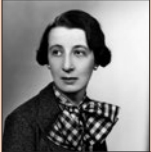
Gordon Daviot (1896 – 1952) is the pen name of Miss. Elizabeth McKintosh, a Scottish born novelist and playwright. She served educational institutions in England and Scotland as a physical education instructor and soon took to writing novels under another pseudonym Josephine Tey.
Remember Caesar (Play) Summary in English
Introduction
This one act play is a parody of Julius Caesar sans the tragic element in it. Lord Weston, a well-established judge is vain. He almost always boasts of his diligence and zealous service to the society. His assistant Roger is bored as a result of having been forced to listen to his tale of success often exposing his inflated ego. With his inflated ego, Judge Weston mistakes the scribbled words “Remember Caesar” to be a threat to his life.The comedy unfolds as the man called Caesar makes his appearance in the end to discuss rose trees to be planted. “Remember Caesar” is a Parody on William Shakespeare’s “Julius Caesar”.
Sermon on diligence
In the beginning of the play Roger demands half-day leave and that was enough for the judge to start his sermon 1 on the value of hard work and his standing in the society as an impartial judge. Roger conveniently switches off; his attention and pretends to take notes of the instructions of the judge. The judge I almost catches in his self-indulgent j absent-mindedness. Roger escapes by the skin of his teeth by just rewinding from his memory the of-repeated j story of his success. He hoodwinks the judge as to the purpose of his demand for half-a-day leave by saying that he wanted to personally interview the award committee as to why they had not forwarded the documents. The judge was quite impressed. The judge asked him to walk to Mr. Clay’s office in the afternoon. He reiterated that diligence, courage and attention to details are required to cultivate an orderly mind. Without an orderly mind no man can hope to excel in any learned profession.
An assassination note
At this juncture, he takes out a crumpled paper from his court pocket. While smoothening the rough paper he insisted j that attention to detail was the beginning ! of greatness. He reads two words “Remember Caesar”. His scholarly mind j connects Caesar to Ides of March and ; the most acted out scene of assassination in Shakespeare’s play “Julius Caesar”.As a coincidence that particular day turns out to be 15th March when Caesar was assassinated by senators. Roger senses the premonition of the boss about a possible assassination. Both discuss the cases in which the strict judgement had angered the affected parties. Roger takes the opportunity to flatter his boss saying that he is always strict. But the judge says the law’s of England are strict.
Mrs. Weston’s sense of humour
When Mrs. Weston hears about it, she tries to play the fool to satisfy the inflated ego of her husband. But she remembers to crack wise jokes all along. She hints that assassins try to hit only famous persons. She allows him to ruin the velvet coat by letting him soak it in a pail of water assuming that parcel would be a bomb to blow him up. When Weston brandishes the gun, she marks it as a poor attempt to foil the assassin by shooting oneself. She obeys the commands of her husband and closes all the doors except the kitchen because the maid is unperturbed by any threat. She is confident of handling any assassin. The ilex tree top gives an ideal location to shoot Mr. Weston according to Mrs. Weston. So, Mrs. Weston orders Joel, the gardener to stay under the ilex tree until further orders.
Comic relief
It was only when one of Weston’s friends called Caesar comes to discuss about rose trees, he recalls that the writing on the paper was his own. He had falsely imagined the short ugly man who dashed against him to have kept it inside his pocket. Lady Weston apologises for having made a statement that an illiterate had made a venomous scribbling in the paper. Roger achieves spending the whole day doing nothing by flattering the boss that his safety was his priority and he could think of other things after he comes out safe.
Conclusion
People who think highly of themselves become butt of ridicule when they stretch their imagination too far.
Remember Caesar (Play) Summary in Tamil
முன்னுரை:
இந்த ஓரங்க நாடகம் உலகப் புகழ் பெற்ற நாடக ஆசிரியர் வில்லியம் ஷேக்ஸ்பியர் எழுதிய “ஜுலியஸ் சீசர்” என்ற வரலாற்றுத் துயர நாடகத்தை நையாண்டி செய்து எழுதப்பட்ட நகைச்சுவை நாடகம் ஆகும். திரு. வெஸ்டன் என்பவர் ஓர் பெருமை மிக்க நீதிபதி ஆவார். எப்போதும் தமது அறிவாற்றல், உழைப்பு மற்றும் சமூ கத்துக்கு தான் ஆற்றிவரும் ஆர்வமுள்ள சேவை பற்றி தம்பட்டம் அடித்துக் கொள்வார். அவரது தற்பெருமைக் கதைகளைத் தினமும் கேட்டு அவரது அலுவலக உதவியாளர் ரோஜர் களைப்படைந்து விட்டார். ரோஜா கன்றுகளை நடுவதற்காக சீசர் விவாதிக்க – முடிவெடுப்பதில் அவருடைய தோற்றத்தில் | நகைச்சுவை வெளிப்படுகிறது. ‘Remember Caesar’என்பது, வில்லியம் சேக்ஸ்பியர் எழுதிய ‘Julius Caesar’ என்பதன் நையாண்டி நாடகம்.
ஊக்கம், சுறுசுறுப்பு, உழைப்பு பற்றிய உபதேசம்
நாடகத்தின் துவக்கத்தில் ரோஜர் வெஸ்டன் அவர்களிடம் அரை நாள் சிறுவிடுப்புக் கேட்கிறார். இந்த ஒரு நிகழ்வே தமது வாழ்க்கைப் பயணத்தைப் பற்றியும், கடின உழைப்பின் தேவை மற்றும் பாரபட்சமில்லாமல் தீர்ப்பு வழங்கும் தமது அளப்பறிய திறன் பற்றியும் சொற்பொழிவு நிகழ்த்தப் போதுமானதாக இருந்தது. ரோஜர் தனது அறிவுத்திறனை புறம் தள்ளிவைத்து விட்டு இயந்திரகதியாக நீதிபதி சொல்வதைக் குறிப்பெடுப்பது போல் பாசாங்கு செய்து கொண்டிருக்கிறார். நீதிபதி ரோஜரின் பாசாங்கைக் கண்டுபிடித்து தான் எதைப் பற்றிப் பேசியதாகக் கேட்கிறார். வழக்கமாக அவர் பாடும் பல்லவியாகத் தான் அது இருக்க வேண்டும் எனச் சரியாக யூகித்த ரோஜர், “அய்யா தாங்கள் வெற்றியை எப்படி அடைந்தீர்கள் என விவரித்துக் கொண்டிருந்தீர்கள்” எனச் சொல்கிறார். அரைநாள் விடுப்பு கேட்ட காரணமாக ஓர் பொய்யை ரோஜர் சொல்லி நீதிபதியை சுலபமாக ஏமாற்றுகிறார். வெகுமதிக் குழுவின் ஆவணங்களை நேரில் பேசி வாங்கத்தான் விடுப்புக் கேட்டதாகச் சொல்லுகிறார். இதனால் அகமகிழ்ந்த நீதிபதி வெஸ்டன் மதிய வேளையில் அவர் திரு. க்ளே அவர்களது அலுவலகத்திற்கு ரோஜர் சென்று வருவதில் தனக்கு எந்த மறுப்பும் இல்லை எனத் தெளிவு படுத்துகிறார். ஓர் சமநிலையான மனதை உருவாக்கிக் கொள்ள தளரா ஊக்கமும், வீரமும் சிறு விவரங்களின் மீது அதீதமான கவனமும் செலுத்த வேண்டும் என வெஸ்டன் அறிவுரை பகன்றார். சீர்நிலையில் உள்ள மனமே எந்த ஓர் தொழிலிலும் கைதேர்ந்தவர்களாக வளர உதவும் எனவும் அவர் கூறினார்.
படுகொலை குறிப்பு
அந்த நேரம் வெஸ்டன் தனது மேற்சட்டைப் பையில் கசங்கிய ஒரு காகிதத்துண்டை எடுக்கிறார். அந்த காகிதத்தை சிரத்தையோடு சீர்படுத்திக் கொண்டிருக்கும் போது ரோஜரிடம் சொல்கிறார், “சிறு விபரங்களிலும் முழுக் கவனம் செலுத்துவது ஓர் தலைசிறந்த மனிதராவதற்கு ஆரம்பம் ஆகும் . அந்தக் காகிதத்தில் “சீசரை மறக்காதே” என்ற இரண்டே வார்த்தைகள் கிறுக்கப்பட்டுள்ளன. யாரோ படிப்பறிவில்லாதவனின் கிறுக்கல் அது எனச் சொன்னாலும் அது சீசர் மார்ச் 15 ஆம் நாள் தனது சகாக்கலாலேயே கொலை செய்யப்பட்டதை நினைவூட்டுகிறது. அன்று என்ன தேதி என ரோஜரிடம் அவர் கேட்கிறார்.) மார்ச் பதினைந்து என்று அவர் சொன்னவுடன் தனது முதலாளிக்கும் சீசருக்கு ஏற்பட்ட துயரம் ஏற்படுவதற்கான ஓர் அபாய எச்சரிக்கையாகவே ரோஜரும் அந்தக் கிறுக்கலை நம்புகிறார். சமீபத்திய தீர்ப்புகளையும் அவற்றால் பாதிப்புள்ளாகி கோபத்தில் இருக்கும் நபர்களைப் பற்றி இருவரும் பேசிக் கொள்கிறார்கள்.
திருமதி வெஸ்டன் அவர்களின் நகைச்சுவை உணர்வு
திருமதி வெஸ்டன் இந்தச் செய்தியைக் கேள்விப் பட்டவுடன் கணவனது தற்பெருமை உணர்வைக் காயப்படுத்த வேண்டாமே என எண்ணி நடக்கும் சம்பவங்களை மனதிற்குள் இரசித்த படியே வலம் வருகிறார். அரசியல் படுகொலைகள் பெரும்பாலும் தலைசிறந்த பெருந்தலைவர்களை நோக்கியே திட்டமிட்டு நிகழ்த்தப்படும். எனவே, வெஸ்டன் பெரும் புள்ளியென்று நிரூபிக்க ஓர் வாய்ப்புள்ளதாக அவருக்கு வாழ்த்துத் தெரிவிக்கிறார். விலையுயர்ந்த வெல்வெட் மேற்சட்டை (coat) வந்த பொட்டலத்தை தம்மைக் கொலை செய்ய அனுப்பப்பட்ட குண்டாக இருக்கலாம் |என அஞ்சி அதை வாளித் தண்ணீரில் புதைக்க முயற்சி செய்து புத்தங்களை வைத்து அமுக்கும் போது அதைத் தடுக்க இயலாமல் மனதுக்குள் வைத்துக் கொண்டு திருமதி, வெஸ்டன் புலம்புகிறார். கணவர் கையில் துப்பாக்கியைப் பார்த்தவுடன், திருமதி. வெஸ்டன் “அரசியல் படுகொலையைத் தடுக்க துப்பாக்கியால் உங்களை நீங்களே சுட்டுக் கொள்ளாதீர்கள்” என விஷமமாக அறிவுரை கூறுகிறார். கணவன் கட்டளையை நிறைவேற்ற அனைத்துக் கதவுகளையும் அடைத்து விடுகிறார். ஆனால் சமையல்காரி சமையல் அறைக் கதவை மூட அனுமதி மறுக்கிறார். யார் வந்தாலும் தன்னால் தனியே சமாளிக்க முடியும் என அவர் கூறி விடுகிறார். திருமதி. வெஸ்டன் அவர்கள் தமது தோட்டத்தில் உள்ள இலெக்ஸ் (அடர்த்தியான இலைகளைக் கொண்டது) மர உச்சியில் இருந்து திரு. வெஸ்டன் அவர்களை சுடுவது எளிது எனக் கிண்டலாகக் கூறுகிறார். உடனே வெஸ்டன் அவர்களது உத்தரவுப்படி தோட்டக்காரரை மரத்தடியில் அமருமாறு திருமதி. வெஸ்டன் கூறுகிறார்
நகைச்சுவையான முடிவு
மூடப்பட்ட கதவை யாரோ ஓங்கித் தட்டுவது கேட்கிறது. ரோஜர் ஓர் நாற்காலி மற்றும் அதன் மேல் ஓர் முக்காலியைக் போட்டு ஏறி யார் எனப் பார்க்கிறார். ரோசா மரம் பதியம் போடுவது பற்றி நீதிபதி வெஸ்டன் ஏற்கனவே சந்திக்க ஒப்புக் கொண்ட அவரது தோழர்களுள் ஒருவரான சீசர் வந்திருக்கிறார். இதைக் கேள்விப்பட்ட பின்பே நீதிபதிக்கு தானே கிறுக்கியத் தாளைப் பார்த்து இவ்வளவு பீதியடைந்திருக்கத் தேவையில்லை என உணருகிறார். கணவரின் குற்றவுணர்வைக் குறைக்க அவரே சொன்ன “யாரோ படிப்பறிவில்லாதவன் விஷமத்தனமாக கிறுக்கியுள்ளான்” என்பதைத் தான் சொன்னதாக மன்னிப்புக் கோருகிறார்.
முடிவுரை
ரோஜர் ஒரு வேலையும் செய்யாமல் | முதலாளியின் பாதுகாப்பே தனக்கு முக்கியம் எனக் கூறி தனது முதலாளியைப் புகழ்ந்து ஒரு நாள் முழுவதையும் வீணடிக்கிறார்.
Remember Caesar (Play) Glossary
Textual:
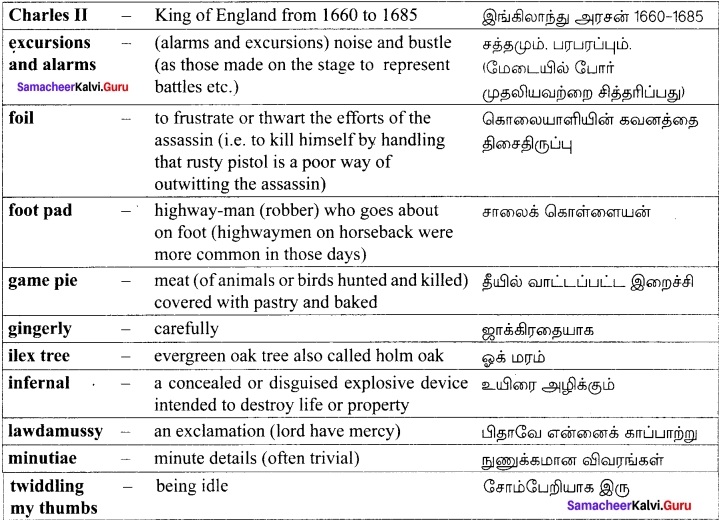
Additional:
